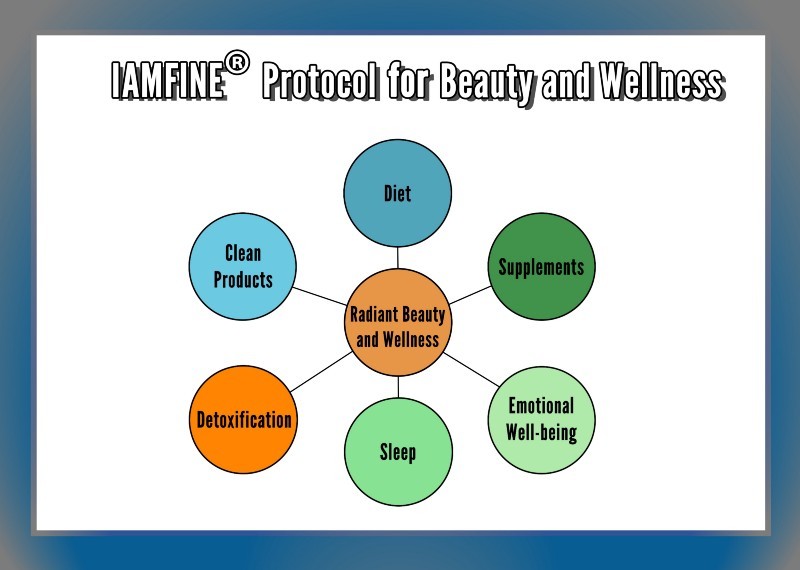Part 1
According to a recent McKinsey-BoF report, “feeling good is the new looking good”. This revolutionary statement completely transforms beauty as a one-dimensional, shallow, outside in approach into a living tapestry of beauty and health from the inside out.
Beauty and wellness are intertwined and, at this point in time, they are converging in a complex landscape where nutrition, beauty, fitness, spirituality, and emotional wellbeing coalesce holistically to make us whole. As our population ages, many strategies are being discovered and marketed to promote overall health and wellbeing that will reflect internally into better health and energy, and externally as more youthful-looking skin. Healthy eating patterns and other lifestyle choices have been linked to resilience against age-related decline. People are living longer, working longer, and wish to continue enjoying all of their activities well into old age. They fervently desire to maintain their attractive looks and youthful energy levels as they age.

At the same time we are enjoying a full-blown revolution in the area of genetics. Medical scientists have revealed that only a minority of our diseases are fully caused by genes, leaving the rest due to the complex interplay between our environment and our genes; this is called epigenetics. Even more surprising is the news that hereditary factors, i.e., our genes, only affect about 25% of our age at death or our longevity.
Epigenetics, or the influence of environment on our actual genes, is quickly emerging as a critical aspect of aging and longevity. Non-genetic factors, particularly diet and lifestyle, clearly affect the development of age-related diseases and affect health and lifespan in the general population.
Beauty is one of the main ways that people visually judge health, and throughout time, beauty has been unconsciously and consciously been used to judge potential partners for their ability to pass along “healthy genes” to potential offspring. In modern times, beauty and its health connotations are still important for both men and women in the workplace, dating arena, and family life as the ability to continue to enjoy and be active with your children and grandchildren becomes even more important with age.
We are now poised to be able to leverage epigenetic findings into improved fitness, health, energy, and beauty. Beauty from the inside out captures this strategy perfectly. In fact, the no-makeup trend that started with celebrities sharing their make-up free looks on social media, is fueling the desire for authentic beauty and the ability to boost one’s natural looks instead of covering up imperfections and painting on perfection using a wide array of cosmetic products.
In my recently published, bestselling book Cracking the Beauty Code: How to program your DNA for health, vitality, and younger-looking skin, I identify and discuss the 6 critical concepts for turning on your beauty genes:

The six concepts capture the best entry points in modifying your own aging process for the better. The diagram also depicts the holistic nature of health and beauty, and shows how seemingly disparate parts of our lives, intersect at the corner of wellness and beauty. In this article, Part 1, I will discuss the first two concepts: diet and supplements.
DIET
In terms of dietary modifications that support wellness and beauty, diet is one of the most powerful epigenetic factors that influences your skin quality and how well you age. It does this by modifying the fundamental processes at the cellular and genetic levels that are responsible for aging, such as the genes that affect collagen (which gives skin its structure and strength) or inflammation (which leads to skin wrinkling). Epigenetics through nutrition, or nutriepigenomics, is an attractive tool to support healthy gene optimization in the aging process.
Studies have shown that it is, in fact, possible to delay skin aging and improve skin conditions through the use of antioxidants. The most important source of antioxidants is provided through sound nutritional choices. The most well-known systemic antioxidants shown to be beneficial in the skin are vitamins C, E, the carotenoids, and the trace elements copper and selenium. Vitamin C is absolutely crucial for collagen formation.
Feed Your Skin These Antioxidant-Rich Foods
• Apples • Asparagus • Avocado • Beets • Blackberries, blueberries, raspberries, strawberries • Cherries • Broccoli • Chocolate/cocoa • Ginger • Green tea • Kale, spinach, and other dark leafy greens • Olive oil • Parsley • Pears • Plums • Pomegranate
The most powerful strategy we can undertake to achieve beauty is to eat for beauty. And since we eat about three times per day, we have ample opportunity to practice good nutritional skin care. You really are what you eat. Food is information for your genes, it tells them what to turn on and what to turn off.
Supplements
The right supplements can also support healthy, radiant skin. Your skin is both nourished and hydrated from within, and also is affected by its environment without. While a healthy, clean diet rich in nutrient density is a must for healthy skin, certain supplements can contribute to an even better glow. Part of the reason supplements are so useful for skin is that our current diets are inferior in quality to the whole foods diet that our ancestors ate, and part of it is from the fact that our soils are so deficient in minerals that our crops, even the organic ones, do not contain nearly as many nutrients as they did even 50 years ago.
A landmark study was published in the Journal of the American College of Nutrition in 2004 regarding nutritional value of fruits and vegetables. They studied U.S. Department of Agriculture nutritional data from both 1950 and 1999 for 43 different vegetables and fruits and found “reliable declines” in the amount of protein, calcium, phosphorus, iron, riboflavin, and vitamin C over the last half century.
One of the most interesting finds for supplements that support skin health is the category of probiotics. People are often very surprised to hear that there is a strong relationship between gastrointestinal health and their skin. The digestive system is much more than just a food processing plant. About 70% of your immune system is located in your gut. And did you know there are so many neurons that reside in your gut, it is considered a “second brain”? Skin health and its condition are representative of what is going on in the body — and health begins in the gut.
The microbiota, formerly known as microflora or flora, has become a hot research interest lately. There are trillions of bacteria colonizing our gut, outnumbering our human cells. The good ones are very busy producing vitamins, undergoing detoxification and metabolism, stimulating the immune response, and helping to keep the bad bacteria in check. In the early twentieth century, some bacteria in the gut were hypothesized to actually produce some beneficial compounds that could protect against premature aging. This discovery set off the whole probiotic culture, as researchers and doctors started identifying these beneficial, good bacteria strains and producing orally administered forms of them to patients.
More recent research on probiotics has demonstrated that orally administered probiotics have decreased skin inflammation in skin conditions such as eczema and acne. More wide-ranging skin effects have been shown as probiotics have also been found to decrease the inflammation-promoting and collagen-destroying chemicals called cytokines, all over the body. This has implications for skin health, but also for inflammation-related disease throughout the body, including arthritis.
Orally ingested probiotics have also been shown to attenuate the damage to skin by UV rays — a unique finding that contributes to our understanding of skin health as a reflection of internal gastrointestinal physiology.
In 2015, a randomized, double-blind, placebo-controlled study was carried out on 110 women between the ages of 41 and 59. A probiotic was given once a day to the active group and the control group received a placebo for 12 weeks. Daily intake of the probiotic was found to significantly increase skin moisture, reduce wrinkling, and improve skin elasticity as compared to the control group. The skin elasticity alone increased by 22% in 12 weeks. That’s a fantastic result from a simple study on probiotics’ impact on skin aging.
This study built on a previous study in mice where it was discovered that the same probiotic regulated the expression of a gene related to skin hydration — the very definition of epigenetics — and also suppressed the UV radiation-induced molecular signaling within the skin cells. This is the very essence of an anti-aging, nutricosmetic agent and a very exciting finding for the future of skin care.
The science of skin aging has exploded over the last five or ten years and has now been defined right down to the molecular level. The study of genomics in aging skin provides multiple targets for preventing or slowing down the aging process in the skin. Through diet and lifestyle changes, including supplementation with certain targeted nutrients, we now have greater understanding, insight, and ability to exert some control over the aging process. The future of cosmetic medicine will be greatly enhanced by the concept of beauty from within and the adoption of lifestyle and diet strategies.
Brooks-Wilson A. Genetics of healthy aging and longevity. Hum Genet. 2013; 132(12): 1323–1338.
Gronniger E et al. Aging and chronic sun exposures cause distinct epigenetic changes in human skin. PLoS Genet 2010 May 27;6(5):e1000971.
Davis DR et al. Changes in USDA food composition data for 43 garden crops, 1950 to 1999. J Am Coll Nutr. 2004 Dec;23(6):669–82
Fusco D et al. Effects of antioxidant supplementation on the aging process. Clin Interv Aging 2007;2:377–87.
Bowe W et al. Acne vulgaris, probiotics and the gut-brain-skin axis — back to the future? Gut Pathog. 2011; 3(1):1.
Lee D et al. Clinical evidence of effects of Lactobacillus plantarum HY7714 on skin aging; a randomized, double blind, placebo controlled study. J Microbiol Biotechnol 2015;25(6).
Originally published at iamfineskin.com.


